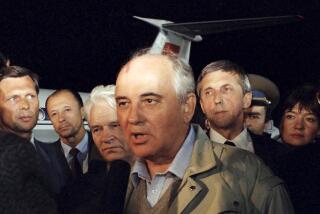The Irreconcilable Struggle Is Behind Us
MOSCOW — Is the visit of Soviet President Mikhail S. Gorbachev to New York connected with Soviet domestic policy?
Yes, it is, but not for the reasons given by Vernon A. Walters, the U.S. ambassador to the United Nations. New York does not have answers for the questions of Soviet domestic policy, but it has a potential for implementing our foreign-policy program. This should help increase the influence of the United Nations in the world and continue a dialogue with the U.S. leadership.
Of course, both domestic and foreign policy are interrelated.
Last week Moscow hosted an important session of the Supreme Soviet, our country’s parliament. I would call it the most representative assembly of peoples’ deputies since the 1917 Congress of the Soviets, which proclaimed the formation of a new socialist state. This meeting of the Supreme Soviet marked the beginning of destruction of the old and the formation of a new--much more democratic--political set-up, and it adopted a decision on drastic changes in the Soviet constitution.
The session emphasized that the formation of a new rule-of-law state in the Soviet Union meant stricter control by the people over all fields of politics, and therefore ensured greater consistency in our foreign policy based on the new thinking.
The new thinking means a change of Soviet views on relations with other countries, first of all the United States.
Take, for example, such a fundamental thing as world outlook. For a long time we saw it divided into two hostile camps, the capitalist and the socialist. We believed that irreconcilable struggle between them would be the main line of international development.
Life proved to be more complicated. Today we in Moscow have a different view of the world. The Soviet Union believes that, with all its differences and contradictions, the world is united, very fragile and interrelated. The interests of global social development must be rated above the interests of a certain class, including the proletariat.
America, too, should abandon outdated concepts. One of them is that the Soviet Union was compelled to sign disarmament agreements only because of the U.S. policy of strength.
Let’s turn to facts. The United States has long been pursuing such a policy, especially since 1980. But that policy of strength resulted in confrontation, arms buildup and permanent tension in Soviet-American relations.
Changes began when the perestroika drive started in this country. In September, 1985, Gorbachev sent Ronald Reagan a letter with constructive proposals that also took account of the American position. That’s when a search for mutually acceptable solutions began. It continued in Geneva, Reykjavik, Washington and Moscow. As the dialogue was gaining momentum, the arms race began to retreat. I’m sure that now we are standing on the threshold of a new and even more important stage of our relations.
More to Read
Sign up for Essential California
The most important California stories and recommendations in your inbox every morning.
You may occasionally receive promotional content from the Los Angeles Times.










